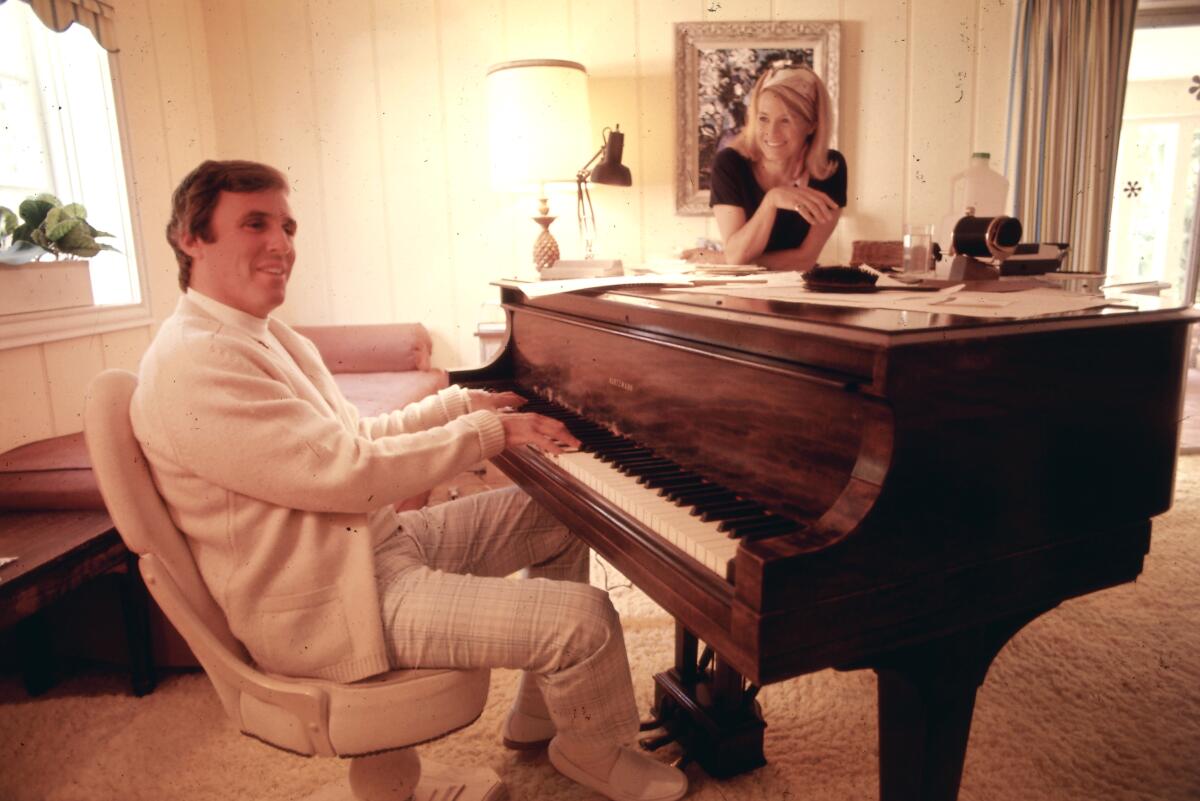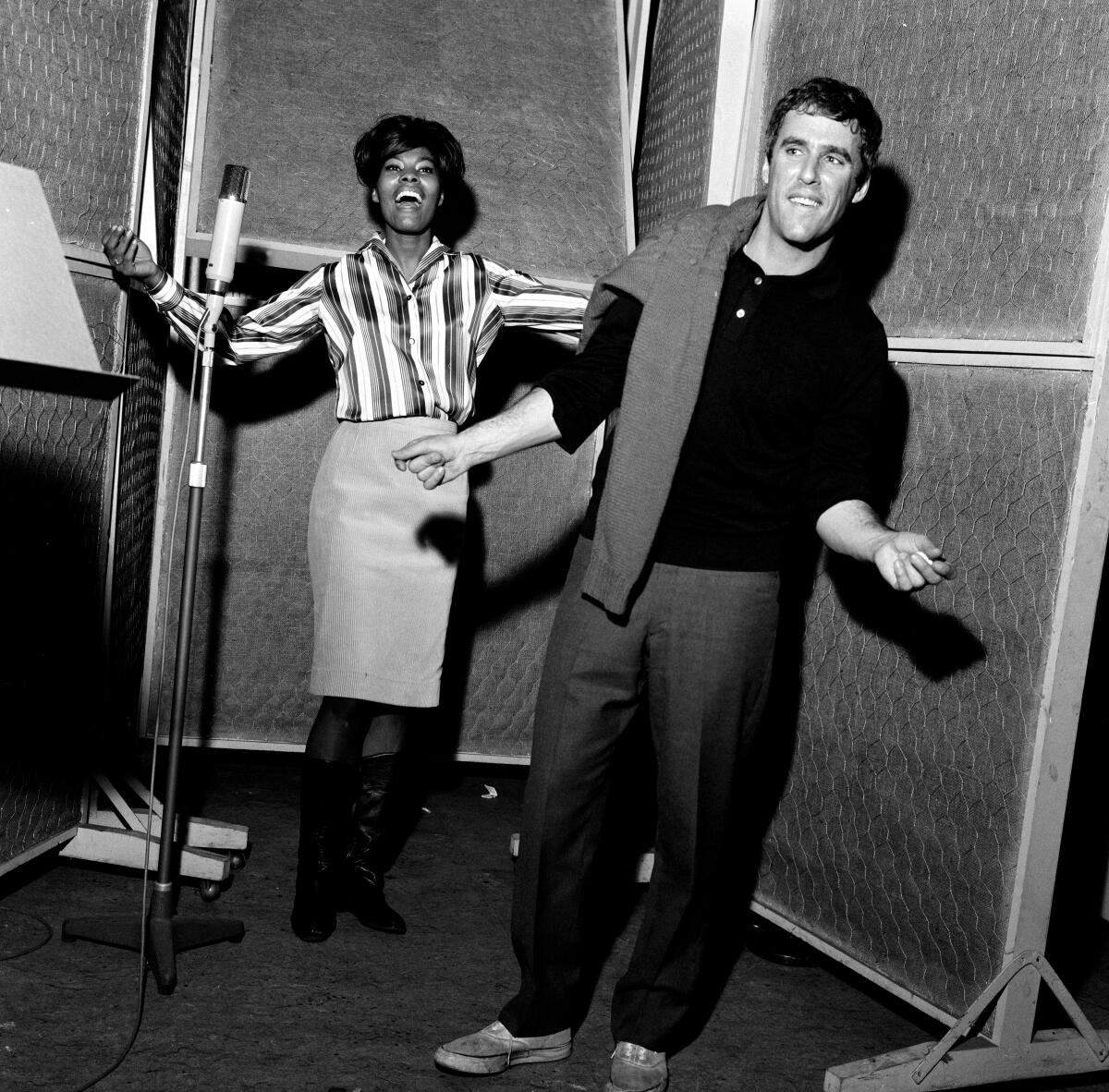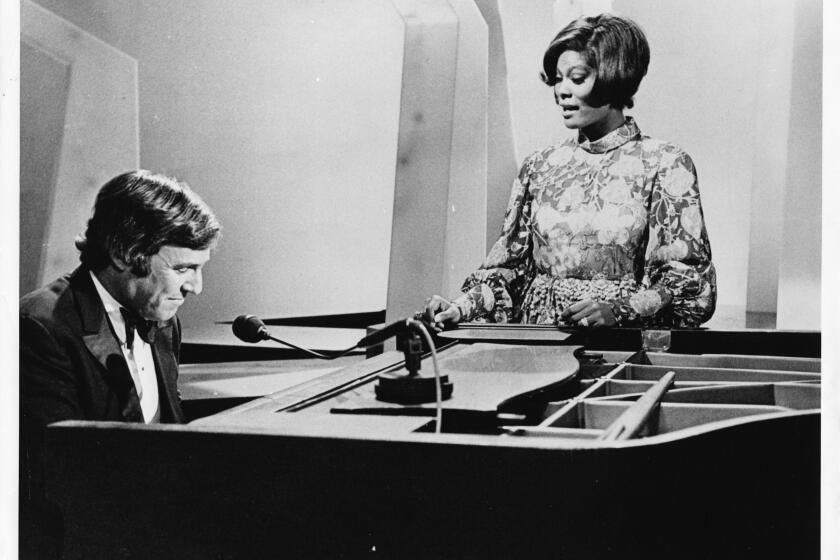Burt Bacharach: 20 essential songs

Music poured out of Burt Bacharach like martinis out of an ice-cold shaker.
For more than half a century, the composer, producer, conductor and sometime performer provided the soundtrack for a persuasive and accessible idea of American sophistication — on the radio, in movies, on television and on Broadway. Bacharach, who died Wednesday at age 94, used his songs to toy with harmony and rhythm and to sneak elements of jazz and classical music into hit-parade pop.
Seen by some as his generation’s greatest songwriter, Bacharach teamed up for hits such as ‘I Say a Little Prayer’ and ‘Do You Know the Way to San Jose.’
Yet to listen to one of his dozens and dozens of classic tunes — which he wrote with lyricists including his most steadfast collaborator, Hal David, and his ex-wife Carole Bayer Sager — was never to feel intimidated by the expertise that close listeners knew he was showing off.
Here, in chronological order, are 20 of his finest songs.
1. The Drifters, “Mexican Divorce” (1962)

After crafting a witty arrangement to illustrate Bob Hilliard’s lyric about “an old adobe house where you leave your past behind,” Bacharach met Dionne Warwick, then a background singer, at the recording session for this Drifters tune.
2. Dionne Warwick, “Don’t Make Me Over” (1962)

Bacharach and David’s first hit with Warwick can still startle you with its blend of romantic desperation and rock-ribbed defiance. No wonder Warwick borrowed its title for a recent documentary about her life and career.
3. Jackie DeShannon, “What the World Needs Now Is Love” (1965)

Listen to the way this waltz-time classic moves between the certainty of the chorus and the uncertainty of the verse; it’s as though the music itself were convincing DeShannon that what she’s singing is true.
4. Dionne Warwick, “Alfie” (1967)

One of Bacharach’s trickiest melodies — and the one he identified as his personal favorite — was also one of his most-interpreted. Yet nobody navigated the song’s unusual intervals as crisply as Warwick did.

5. Dusty Springfield, “The Look of Love” (1967)

Has any film comedy ever yielded a song sexier than Springfield’s sultry invitation to take a lover’s vow (and seal it with a kiss)? Composed for the 1967 James Bond spoof “Casino Royale,” “The Look of Love” literally defines the concept of bedroom eyes.
6. Aretha Franklin, “I Say a Little Prayer” (1968)

Franklin’s lead vocal cooks, obviously. But pay attention to how much fun the Sweet Inspirations are having with Bacharach’s melody on backgrounds.
7. Herb Alpert & the Tijuana Brass, “This Guy’s in Love With You” (1968)

A comically straightforward sentiment becomes an improbably dramatic proclamation.
8. Dionne Warwick, “Do You Know the Way to San Jose” (1968)

Warwick famously disliked this sprightly character sketch about a failed actress who ditches cutthroat L.A. for her quieter hometown. Or at least she did until it earned her her first Grammy.
9. Isaac Hayes, “Walk on By” (1969)

For all their complexity, Bacharach’s structures were exceedingly tidy, which is why Hayes blew so many minds with the 12-minute psychedelic-soul odyssey he made of “Walk on By.” Among those minds: the RZA, who sampled Hayes’ version in the Wu-Tang Clan’s “I Can’t Go to Sleep,” and Beyoncé, who did the same in her “6 Inch.”
10. B.J. Thomas, “Raindrops Keep Fallin’ on My Head” (1969)

An Oscar winner, a No. 1 hit and a Bacharach specialty: a happy song that sounds sad (or is it the other way around)?
Legendary singer Dionne Warwick said that despite her tiffs with late composer Burt Bacharach, they always let each other know they were like family.
11. The Carpenters, “(They Long to Be) Close to You” (1970)

Instantly recognizable from its opening piano plinks, the sibling duo’s first chart-topper is a master class in yearning whose gorgeous melody credibly embodies David’s lyric about angels sprinkling moon dust. See also: Stevie Wonder’s live talkbox rendition from “The David Frost Show” in 1972, later sampled by Frank Ocean on 2016’s “Blonde.”
12. The 5th Dimension, “One Less Bell to Answer” (1970)

Swanky grown-up soul music in no hurry to get anywhere.
13. Burt Bacharach, “Something Big” (1973)

Bacharach wasn’t a powerhouse singer by any means, but his laid-back croon had an undeniable vibe, as heard in this gently philosophical bossa nova in which he compares himself to “a grain of sand that wants to be a rolling stone.”
14. Luther Vandross, “A House Is Not a Home” (1981)

An R&B slow jam so perfect that Kanye West sampled it for his song “Slow Jamz,” Vandross’ epic reading of this jilted lover’s lament carried Bacharach’s songwriting to new emotional heights.
15. Christopher Cross, “Arthur’s Theme (Best That You Can Do)” (1981)

Bacharach’s second Oscar-winning tune took Dudley Moore’s drunken playboy character more seriously than the character did himself.
16. Naked Eyes, “Always Something There to Remind Me” (1983)

First cut in the early ’60s, this bouncy meditation on the painfulness of memory could still pull heartstrings two decades later.
17. Dionne & Friends, “That’s What Friends Are For” (1985)

A song of the year Grammy winner for Bacharach and Sager, “That’s What Friends Are For” offered Warwick and her famous friends — Stevie Wonder, Gladys Knight and Elton John — all the room they needed to play.
18. Patti LaBelle and Michael McDonald, “On My Own” (1986)

As good a song as anyone’s ever written about the reality of romance in middle age.
19. Elvis Costello, “God Give Me Strength” (1996)

The post-punk troubadour teamed with Bacharach to write this sumptuous ballad for Allison Anders’ sort-of Carole King biopic, “Grace of My Heart.” Then, they kept at it and made a whole album of original tunes, 1998’s “Painted From Memory.”
20. Ronald Isley, “Anyone Who Had a Heart” (2003)

Bacharach followed the Costello collab by drafting Isley to sing an album of his classics, including this one, in which Isley runs the full gamut from whispering to pleading.
More to Read
The biggest entertainment stories
Get our big stories about Hollywood, film, television, music, arts, culture and more right in your inbox as soon as they publish.
You may occasionally receive promotional content from the Los Angeles Times.













